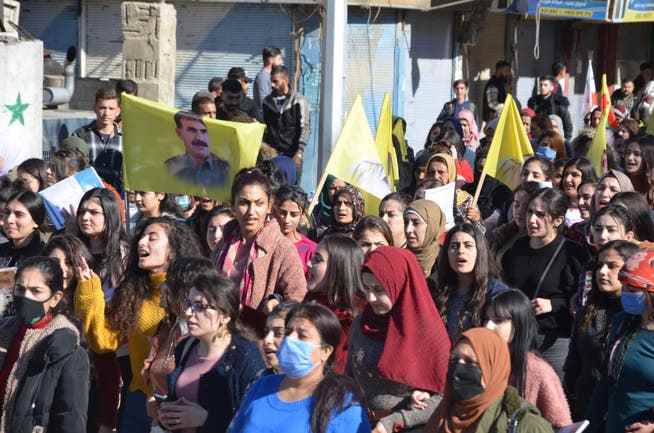The Kurds announce retaliatory measures after dozens of people died in the attacks. Ankara invokes “self-defense”.
After the Turkish air raids, the extent of the destruction became apparent on Sunday. A power plant was hit in the Syrian province of Hasakeh.
A week after the deadly bomb attack in Istanbul, Turkey has targeted Kurdish targets north of neighboring Syria and Iraq. The Defense Ministry said on Sunday that a total of 89 bases and safe havens of Kurdish terrorists had been destroyed by the “clawed sword” military operation, which was conducted exclusively from the air. Before that, the Ministry of Defense had spread the image of a fighter plane on Twitter with the headline “The time of reckoning”.
Hesap zamanı!
Alçaklardan hain saldırıların hesabı soruluyor! ?? pic.twitter.com/pnEbFDkOF7
— TC Millî Savunma Bakanlığı (@tcsavunma) November 19, 2022
dozens of dead
According to the Syrian Observatory for Human Rights, the Turkish airstrikes killed 27 people and wounded 38 others. Kurdish fighters, members of Syrian dictator Bashar al-Asad’s government army and civilians are among the dead. A spokesman for the Syrian Democratic Forces, the Kurdish-dominated military alliance in the north-east of the country, even spoke of 11 civilian fatalities and promised revenge.
The Turkish attacks were carried out along much of the northern Syrian border area, from Kamishli in the far northeast to areas north of the major city of Aleppo. In Iraq, targets were targeted in the regions of Asos, Hakurk and Kandil. In the Kandil Mountains is the headquarters of the banned Kurdistan Workers’ Party, PKK.
It is unclear whether the Turkish warplanes entered Syrian airspace or launched their missiles over Turkish soil. Russia, an ally of the Asad regime, has air sovereignty over much of the country. Ankara is therefore dependent on Russia’s approval for major military operations in Syria, which Turkey has already carried out three times since 2016.
Turkish President Erdogan announced renewed military intervention in Syria in May. The fact that this has not happened so far is mainly due to the lack of Russian approval. Since then, however, the balance of power between Moscow and Ankara has shifted in favor of Turkey.
“Right to Self-Defense”
Ankara justifies the recent airstrikes with last Saturday’s terrorist attack and refers to its right to self-defense. A bomb exploded in a pedestrian zone in Istanbul on November 12, killing 6 people and injuring more than 80. Turkey blames the PKK for the explosion.
Interior Minister Süleyman Soylu said on Monday after the arrest of the main suspect, a Syrian national, that he was acting on orders from the People’s Defense Units (YPG), the strongest force in Kurdish-controlled north-eastern Syria. Ankara sees the YPG as an arm of the PKK. Both groups are considered terrorist organizations in Turkey.

Female supporters of the Kurdish PKK and the Syrian Democratic Front (SDF) protest against the Turkish airstrikes in north-eastern Syria.
Since then, dozens more people have been arrested in Turkey. At the end of last week, five arrests were also made in Bulgaria. It is a Syrian and Bulgarian and Moldovan nationals who are said to be active as smugglers.
Lots of open questions
However, the PKK and the Kurdish forces in Syria have denied any responsibility for the attacks in Istanbul. The Kurdistan Workers’ Party has been fighting the Turkish state for forty years and has not shied away from attacks with civilian casualties in the past. The PKK is therefore also considered a terrorist organization in the EU and the USA.
Nevertheless, questions remain unanswered, for example about the motive. Such a prominent attack weakens the Kurdish position, especially at this point in time. Ankara has long been calling for more international support in the fight against militant Kurds in the country itself and in the vicinity. The dispute over Sweden and Finland’s admission to NATO revolves around this question.
It is even more of a thorn in Ankara’s side that the USA made the YPG People’s Defense Units their most important allies in the war against the Islamic State in Syria and that a Kurdish-controlled area was created in northeast Syria as a result. Last week, Turkish Interior Minister Süleyman Soylu blamed Washington for the attack in Istanbul and rejected American expressions of condolence.
